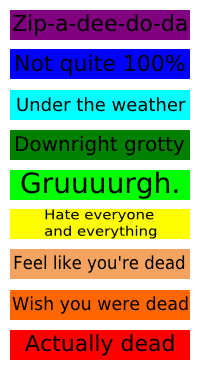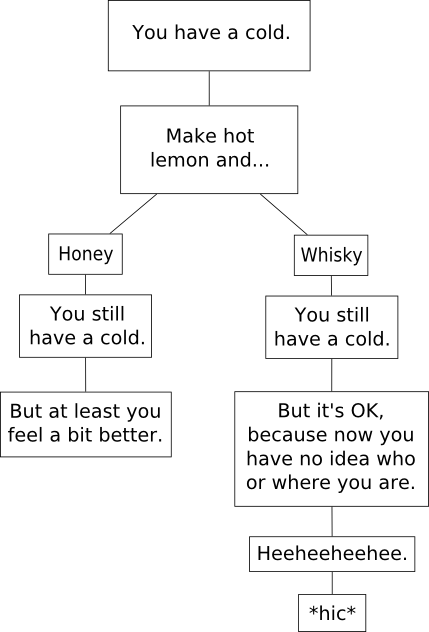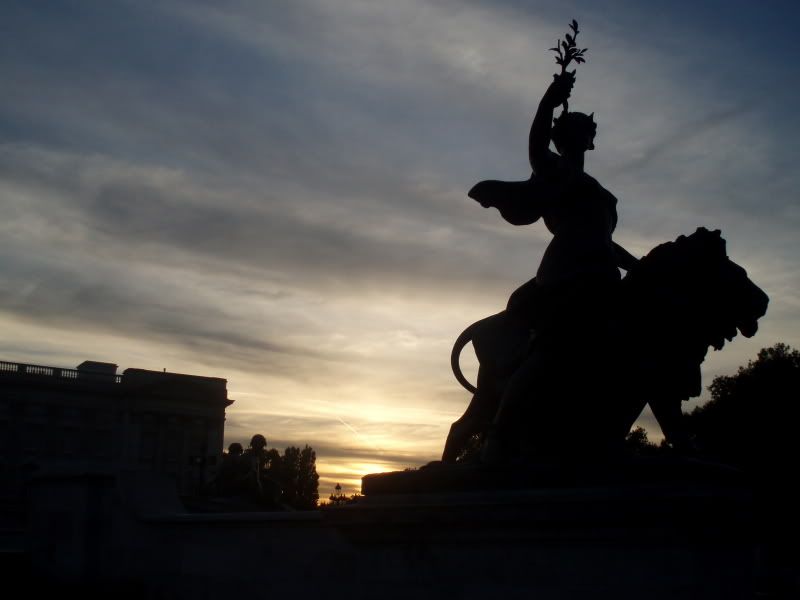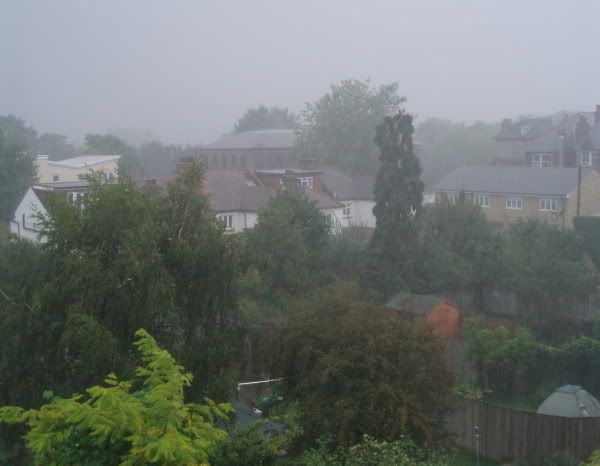I am currently sniffing and snorking my way through the first cold I've had in about a year. Fortunately, I seem to be blessed with a very strong immune system, and I haven't been properly ill for at least a couple of years; that said, I've gone down with a cold in September/October pretty regularly for a while, and it seems that it is once again time.
When anyone gets ill, the first consideration is obviously the seriousness of the illness. There's a standard scale for this – anything really serious (for which the doctor has to report it to the authorities), then things that will hospitalise you, then things that will at least get you off work for a few days, and lastly those illnesses that are more of an inconvenience, and which can usually be cured with a couple of days of casually infecting colleagues and moaning that you really shouldn't be at work.
Colds, unfortunately, fall into this last category, unless they're really bad (or unless the World Cup happens to be on). Tell your boss that you're not coming in because you've got a bit of a sniffle, and you're fairly unlikely to receive any sympathy. I think, though, that not enough importance is given to another very significant aspect of any illness – how bad you think it is.
I have drawn up this handy chart to illustrate. Where did your last illness fall on this?
It's weird, isn't it, how male bravado can somehow incorporate making a cold seem like the end of the world? For the most part, if you complain about anything, you're a wuss (and heaven help you if you ever cry); but as soon as your nose starts doing its Niagara Falls impression, it's suddenly entirely legitimate to spend all day watching Countdown and wailing plaintively for tea. Personally, I think that man flu is a fantastic invention, not least because it illustrates so well the convention of making words manlier by putting "man" in front of them. It's a way for men to indulge their vulnerable side in a socially acceptable manner, and they get tea as well. Bonus.
Sadly for me, weaseling out of work is not really going to be an option, partly because I was there today and my boss knows full well that I can at least muddle through even when I have to go and evacuate my nasal passages every few minutes, and partly because I told my employers about this blog as part of the recruitment process, and they may come back at any time. So instead, I'm planning on trying out home-made cold remedies. I'll leave you with the standard process.
Monday 29 September 2008
Yep. Sorry. Can't come in today. I've got diphtheria.
Posted at
7:28 pm
2
comments
![]()
Wednesday 24 September 2008
Summer in the City: Royal Sunset

Reports of the death of Summer in the City appear to have been greatly exaggerated. For one thing, I have finally got hold of a copy of the song that gives this series its name (it's just as great as I remembered); for another, last Saturday was such a beautiful day that I had no choice but to head back into London.
Because London's crammed full of statues, you might well have difficulty recognising the subject of this photo. You may be surprised to know that it's actually part of the Victoria Memorial, directly in front of Buckingham Palace. On one level, this memorial is something of a monstrosity – in common with a lot of Victorian stuff, it's overblown, rather gaudier than the stereotypical British reservedness would suggest, and far bigger than it needs to be. (Nowhere near the Albert Memorial in those terms, of course, but then very little is.) It's also got a very nautical theme, which probably made sense back when Britain was a formidable naval power, but now just seems a bit confusing.
That said, I do rather like it. If you're putting up a statue in the first place – something that, by definition, says "check us out, we're awesome" – then you're probably not the type of person who worries about looking silly. That kind of arrogance, the ability to effectively scrawl a message across a public street with several tons of stone and then throw in a fountain for good measure, is refreshingly direct. It reminds me of the good parts of the British Empire: at the same time that my ancestors were merrily pillaging other people's countries (through the cunning use of flags), they were also undertaking massive feats of engineering, thinking nothing of driving a railway hundreds of miles across barren wastelands or dropping a bridge anywhere they pleased, because they could.
It's a good thing that the sun did eventually set on the British Empire, but you could be forgiven for looking at what was left and feeling just a little wistful. The statue in the photo, of a noble figure gazing out into the distance, with a lion for some reason, seems completely disconnected from reality. But that's the point. The Victorians ploughed ahead into the future, but left behind them a country that was trying to stand proud and noble in a time that it no longer owned.
There's something very sad about these monuments, but it also leaves you with, as Douglas Adams said, a profound sense of something or other. I think that's really worth quite a lot.
Posted at
11:11 pm
1 comments
![]()
Tags: history, summer in the city
Sunday 21 September 2008
Playing "Dr. Evil" by They Might Be Giants did not help me write this as much as it should have.
Channel 4 has been showing the Lord of the Rings trilogy over the past couple of Saturdays (The Return of the King is on next week, if you're interested). Although I love these films – I think the books are great, and I have the extended edition DVDs – it seems that I can't take them remotely seriously if I come in half way through. Watch from the very beginning, and you get drawn completely into the story, which is on an incredibly epic scale; come in an hour or so into it and you have a bunch of beardy people wandering around making vague and incomprehensible statements. And sometimes they say "Tell me, where is Gandalf, for I much desire to speak with him?", which makes me dissolve into giggles every time.
Once you get into it, though, The Lord of the Rings is a great example of a very old storytelling technique: Good in a titanic struggle with Evil. Sometimes the Good characters are flawed or questionably ethical, sometimes the Evil characters are doing the wrong thing for good reasons; nevertheless, some form of this conflict drives a pretty high percentage of storylines in film, literature and other media. (And most of the rest are some variant of "boy meets girl, boy smooches girl, boy and girl live happily ever after.") What I find particularly interesting in this framework is the flexibility with which you can portray evil.
Probably the most prevalent type of evil character is the "greed driven to manic proportions" type. Whether they're after money (Die Hard's Hans Gruber), power (Star Wars' Sith) or both (pick a Bond villain), the pattern is clear – these guys (and it's almost exclusively guys) want something so very badly, they will stop at nothing to get it. I suspect that they're used so much because it's very easy to identify with them. Humans are naturally greedy, and most people can point to at least one occasion when greed pushed them to do something that they knew was wrong and that they wouldn't otherwise have done. The "greed villain" is simply an extension of that concept.
Then we have the "altruistic evil" character, the one who is trying to correct a major injustice, and is now committing his own injustices to do so. The Die Hard trilogy comes in again here with its second installment, trotting out the "disgruntled ex-military official sticking it to his even more evil superiors" trope. Interestingly, this kind of evil is one that is very, very close to the characteristic of "one man breaks the rules to bring great justice", which is reserved solely for heroes. Not that it should be, of course – I've written at some length about this – but I find it interesting that the same traits can be used equally for a wholly good character and a wholly evil one.
Thirdly, we come to the "just plain evil" character. These are rare, probably because it's impossible to identify with them unless you are willing to admit that you are also completely evil and carrying out atrocities for no reason other than that you wanted to. This loops us back round to The Lord of the Rings, with Sauron; although he has elements of "greedy evil", he's supposed to be the Satan character of the story, and as such is simply out to destroy all that's good. Everything touched by Sauron's influence becomes corrupted; the men who take the Nine Rings become Ringwraiths, fulfilling the human desire for immortality while removing the free will and capacity to do good that would give it any meaning, while the Elves (beautiful and pure creatures in the books, instead of...well...Orlando Bloom) become the Orcs, hideous and crude characters bent on destruction.
These categories often have fairly indistinct boundaries, but once a character is fixed in one of them they don't often move out. That's a shame, as stories are often vastly improved when this does happen. Take the Sean Connery/Nic Cage vehicle The Rock. At first, the villains are all obviously from the second category, attempting to restore recognition to Marines that have been "disappeared" by their government. However, it later becomes clear that only two of them actually fit that description, with the others having only come along for the money. That sets up a much more interesting situation, in which our villains come very close to crossing into hero territory, despite having actively participated in brutally slaughtering a large number of people.
The same thing happens in webcomics. In Rich Burlew's Order of the Stick, key baddie Xykon has consistently been painted as something of a fool – an evil fool, undoubtedly, with all the trappings of a standard Dark Lord (he used to live in a dungeon filled with goblins, for crying out loud), but a fool nonetheless. Even though he clearly enjoys performing acts of evil, his heart (or his chest cavity, at any rate) is not in it, and he's only really doing it for the theatrics. Even when Xykon kills Roy, the key character of the strip, he gives him the chance to back out of the fight and go off and train for a bit, just so that they can be on level terms. Although he does want to win, he also wants to make it interesting; the real evil planning and methodical destruction is left to his sidekick Redcloak.
Burlew has clearly noticed that Xykon's comedy value has been damaging his position as key antagonist of the strip, and he's fixed that by releasing a prequel book (Start of Darkness) telling us about Xykon's origins and motivations. (Plenty of spoilers ahead, so OotS fans who haven't read it may want to look away now.) In this book, Redcloak is portrayed as a clear second-category villain, doing everything for the good of his people and his god. He may be evil, and he may be responsible for the destruction of entire cities (and destabilising the universe), but he has an internally consistent reason for all that he does.
Xykon, on the other hand, is just flat-out evil all the way. He double-crosses his own men, makes people work for him by threatening their entire families with death, magically rips off all of his own flesh in order to become more powerful, and finally tricks Redcloak into murdering his own brother so that he can be certain of his loyalty. This is not an "oops, I appear to have accidentally yet joyfully killed someone" evil character, this is a monster without any saving graces whatsoever. His comedy role has been completely overtaken by the Monster in the Darkness, who, incidentally, is very similar to the Xykon from the online strip: despite its own considerable power, it doesn't actually care what it does so long as it gets tasty food.
Given that a lot of art is to do with reflecting reality, should we be worried that evil characters are so popular? Probably not. It's incredibly unlikely that anyone is going to watch Darth Vader choking someone to death for their incompetence and say "hey, I know, Billy over there didn't do what I asked him to - I think I'll strangle the life out of him!" Indeed, we have more to worry about with the portrayal of heroes, given that much of the US's current policy on human rights for terrorist suspects seems to be based on Jack Bauer's opinions. Villains are an acceptable outlet for our own less-than-wholesome sides, and let's face it, they're just damn cool.
Thank you for reading. I will be retreating to my Dark Tower to cackle and plot your downfall momentarily.
Posted at
4:43 pm
0
comments
![]()
Friday 12 September 2008
Summer in the City: Deluge
"Summer?" I hear you shout, incredulously. Well, actually, I don't, given that none of my regular readers (all three of them) live remotely near me, but I imagine that if they did, I would, because really, the summer has rather passed us by. After a few weeks of sun earlier in June and July, autumn has set in early, and it looks as though Summer in the City is doomed to disappear into the ever-increasing list of Small And Incomplete Blog Features. So let's make the most of it, as I present...
...oh. More rain. Specifically, this is part of the view from my window in Enfield, taken as the heaviest rain that I've seen for some time threw its weight against the town.
In what must be a kind of British self-defence mechanism, I do quite like the rain. If I'm indoors, and it's warm, and ideally if I have tea and dark chocolate digestive biscuits (for any American readers: you can buy them on Amazon, and you must do so right this second), then I find the sound of heavy rain really soothing. Just something about not having to be outside in it, I think. And then you can go out and sample that damp and earthy smell, and play dodge-the-slug all down the street. OK, so that's not quite such a good part.
In this case, I was at my computer, and saw a flash of lightning illuminate the wall of my room. I got to the window just in time to see a proper Hollywood rain storm – you know the kind. A roll of thunder, a slight hiss as the rain begins, and then within seconds it's bucketing down. I practically expected Gene Kelly to start soft-shoeing his way down the street outside.
About half an hour later, it was over, with just a few spots of drizzle attempting to keep the mood up. London has missed the worst of the recent "extreme" weather, but it seems that we now have to head onward into the rapidly cooling and dampening autumn. Time to batten down the hatches and put the kettle on.
Posted at
12:07 am
0
comments
![]()
Tags: personal, summer in the city



